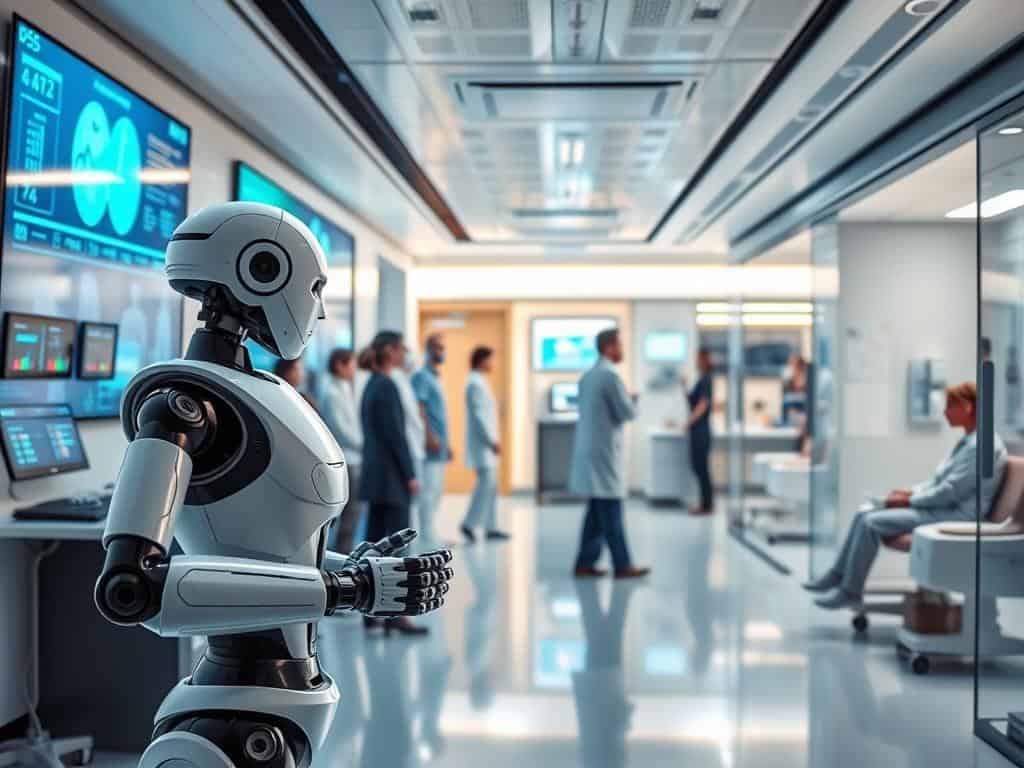The global AI healthcare market is huge, worth $16 billion today. Experts expect it will jump to $173 billion by 2029. This isn’t just about more money in tech. It’s about changing healthcare from the ground up. AI helps doctors do complex tasks and make better diagnoses. This means patients get better care. The world has a lot of healthcare data, about 30% of all data. AI is great at making sense of this big data. As we look into how digital tech is changing healthcare, it’s clear. AI is crucial for overcoming big healthcare problems, like not having enough healthcare workers and the high costs of services.
AI is making big changes in healthcare tech, like speeding up new medicines and making supply chains better. By 2030, we’ll be short of over 250,000 healthcare workers. AI offers smart solutions to fill this gap. AI uses tools like machine learning, understanding human language, and reading from pictures. These tools have huge potential. They can solve big problems and make hospitals run better.
Key Takeaways
- The global AI healthcare market is anticipated to grow from $16 billion to $173 billion by 2029.
- AI can enhance diagnostic accuracy and reduce human error in patient care.
- Approximately 30% of the world’s data volume is healthcare-related.
- By 2030, there could be a shortfall of 18 million healthcare professionals globally.
- AI technologies are able to analyze unstructured data, promising improved medical insights.
- Integrating AI can lead to more efficient inventory management in the medical supply chain.
Introduction to AI in Healthcare
Healthcare is changing fast with AI technology. This tech is solving big problems like staff shortages and more chronic diseases. Using different kinds of data, including DNA and medical info, is key in improving healthcare.
Tech giants see how AI can make healthcare better and more efficient. This is especially true during global health emergencies.
The Rise of AI Technologies in Healthcare
NYU AI Studio is making waves with its safe and HIPAA-ready tools. On the other hand, CoPilot.microsoft.com is secure but not HIPAA compliant, which can be a drawback for handling private health info. Getting access to tools like NYU Langone’s AI needs special approval, showing how vital data safety is in health tech.
Big names like IBM, Apple, Microsoft, and Amazon are all in on AI for health. IBM’s Watson has been learning from human language since 2011. Today’s AI learns from data to better diagnose and treat illness. It also makes patient care better by making diagnoses more accurate and clinical work smoother.
But, health groups often struggle to add AI into their current tech. Early AI helped with clinical decisions, but blending it with existing systems is hard. Overcoming these barriers is a must to fully use AI in healthcare.

Applications and Benefits of AI in Healthcare
AI is changing healthcare in many ways. It makes diagnosing diseases more accurate, makes getting supplies faster, and helps find new medicines quicker. It’s important to see how AI helps in different areas of healthcare.
Enhancing Diagnostic Accuracy
AI improves how doctors diagnose diseases by looking at lots of medical data. For example, iCAD’s ProFound AI can find possible cancers early. This means diseases get spotted sooner, which can save lives and make health studies better.
Transforming Patient Care
AI is also changing how we take care of patients. Now, doctors can check on patients from afar, thanks to AI. This quick checkup means doctors can act fast when needed. A survey found that 64% of patients are okay getting help from AI through nurses. This shows more people are trusting AI to keep in touch with their health care teams.
Streamlining Medical Supply Chains
AI helps keep hospital supplies in check. It predicts what will be needed using past and current data. This cuts down on not having enough supplies or wasting them. Hospitals using AI to manage supplies are seeing lower costs and always have what they need.
Accelerating Drug Discovery
When it comes to finding new drugs, AI is a game-changer. It can sort through huge amounts of data and test how molecules interact. This means new treatments can be developed faster and cheaper. A project between IBM and Cleveland Clinic uses AI to speed up medical research. As AI gets better, we could see many new treatments coming out sooner.
Conclusion
The path to AI in healthcare’s future is starting, and its impact will be huge. Looking at healthcare now, it’s obvious that adding AI into areas like medical imaging will change how we care for patients. For instance, AI boosts the accuracy in spotting early breast cancer to 91%. This is a big jump from old methods.
As we move into a digital age in healthcare, two main goals stand out. They are improving how we care for patients and making operations more efficient. By using AI, doctors can cut down on wrong diagnoses. They can also streamline daily tasks. Plus, AI helps in mapping out diseases early on. This lets doctors personalize treatment, which really betters patient care.
I see a bright future where AI is key in healthcare. With more investment and tech leaps, I’m sure AI will change our healthcare systems. It’s heading towards a future where treatment fits the patient more closely. And it’s done with amazing accuracy.